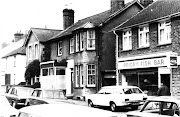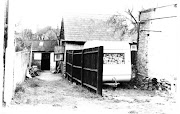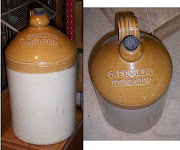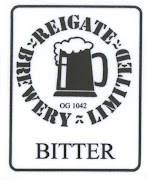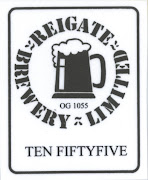FURTHER BREWING CONCERNS FROM MID-19TH CENTURY ONWARDS.
Before leaving Reigate, and moving on to breweries in Redhill, there are left one or two brewers of whom we know little to date but nevertheless are well worth a mention here.
The 1862 edition of Kelly's Directory for Surrey lists Arthur John Charles White as a "Common Brewer" at the Eagle Brewery, Hotel and Tap, which was situated on the eastern side of Croydon Road, Reigate, between the railway bridge and junction with Doods Road. Arthur White came to Reigate from Weybridge in 1859 where for some time previously he carried out the same trade. Curiously enough he does not appear in the 1861 Census for Reigate. In 1884, the brewery passed to his son Horatio, who continued on for another eight years, and then moved his business to the Roses Brewery in Redhill (more of which later).
The brewhouse of the Eagle fell into disuse, but the Hotel continued on, the bar of which being supplied by Messrs Friary, Holroyd & Healy of Guildford. The Eagle closed in 1956, and the licence crossed the road to the Panther PH. The old Eagle premises finished life as a local office for Friary Meux Ltd.
Another brewery, although small, stood at the South End of Priory Road in South Park, Woodhatch, and was called The South Park Brewery. The earliest reference is found in Kelly’s 1859 directory of Surrey, wherein the concern is listed as David Durrant, Freehold, Reigate. Later in 1862, the address is given as Holmesdale; and between the years 1867 and 1882, as just South Park. These differences of address leave no reason to suspect any removal of business, but only that they were different ways of describing the same address in local terms. The census of 1861 lists David Durrant as residing in Heraditament 1629 and describes the property as:
"House, brewery, and garden, in an area of land about 27 poles, with field adjoining, area about 2 roods."
By 1890 the business had become Durrant & Sons, 66, Priory Road, and by 1902, the Post Office had renumbered the property 56, Priory Road. In about 1905, the business had passed to David Durrant’s son, Alfred, and between 1908 and 1915, the concern was listed as Alfred Durrant & Son. In the Surrey Directory for the latter year, an advertisement appears describing the firm as brewers and cider merchants. By 1917 the site was listed as vacant, and the author suspects that the business was forced to close due to the employees leaving for military service at the outbreak of the First World War. The trade, including the Barley Mow, was sold off to Page & Overton’s of Croydon.
Of the brewery itself all that remains is the main house, now a private dwelling with a shop front (since added) and a range of small brick outbuildings at the rear, accessed by way of a narrow passageway. It is interesting to note that on the wall of one shed, remain the marks of barrels – in parallel lines – attesting to decades of constant stacking. It is thought that a much larger range, and perhaps a covered gateway stood beside the building, and this conclusion is drawn from variations of colour on the outside of existing walls, and a whitewashed area which may still be observed on the open wall clearly showing the outline of former eaves.
In the cellar of the brewery can still be seen the old artesian well and a pair of barn-doors leading into a pit outside the house, up which barrels would have been hoisted.
However, behind the house, and curiously enough, in a long plot which runs between the bottom fence of houses backing either side of Priory Road and Eastnor Road (which runs parallel to Priory Road), lie the remains of a large orchard, containing apple trees of some antiquity. This is all that remains of the field shown in the plan of the 1861 Census, and obviously formed the stock-in-trade of Durrant’s cider adjunct.
David Durrant lived at the top of Priory Road, immediately to the north of a footpath leading to the Barley Mow PH in Eastnor Road, and it was here that he had his stabling, cooperage, and forge. In fact, the old forge still stands, used until recently as a workshop for a lawnmower repair service.
The Barley Mow in Eastnor Road was Durrant’s only beershop, serving as the Brewery Tap. It was formerly a Cider House only, sharing its unique character in Surrey with only one other property, the Cyder House at Shackleford.
The Earliest Reference I have of the property shown as a pub is on Eves Map of 1861, which was compiled for the Census of that year. The Terrier, or text, which accompanied the map makes reference to Hereditament 1535 shown on the map, and describes it as:
“House, beershop and garden, owned and tied by trade to David Durrant, and run by James Stone.”
There is also an entry some 30 years later in a Reigate Petty Sessional Report dated 1892 wherein is made reference to the Barley Mow, South Park. These are the licensing records which gives a synopsis of the type of trade and the behaviour of customers during the previous 12 months upon which a decision as to whether a license is reissued or not. This property has the entry:
“ Beerhouse, licensed prior to 1869…” [which fits in nicely with Eve’s Census – Ed.] “…owned and tied by trade to David Durrant of Reigate, brewer, and run by J.W.Bowles who resides on the premises. Frequented by cottagers and labourers. Conduct satisfactory”.
This one property, though small even by the standards of the time, may not give a true indication of the brewery’s importance in the neighbourhood. For one thing, the family trade in the Victorian and Edwardian days was of incomparably greater significance than now. For another, the greater influence of the landed interest accounted for a large number of pubs which were not brewery owned, but by no means all of which home-brewed. There is also evidence to suggest that when inns did brew their own beers, they confined their efforts to draught beer and to dark beers; pale ales and all bottled beers being left to the more sophisticated “Common brewers”. It was also usual for inns to be tied to a brewer by means of loans, as in the case of many licensed clubs today, without the brewery actually owning the property. A further consideration which must not be ignored is the family trade, and this type of business cut a much larger slice out of the overall trade figures in those days than it does today. It was not at all unusual for the average household to have one or two firkins of beer in the pantry from which to draw a daily draught of “Dinner Ale”. It may be reasonably safe, therefore, to deduce that the bulk of Durrant’s trade relied upon the sale of beer and cider to local “Free-houses” and to the family market.
The third and final brewery stood in Glover's Road, Reigate, and was run by Cidemon Cooper at the turn of the century. In the 1880's the property was named Hillview Lodge and was the residence of Harrison Ainsworth, author. It is believed that upon leaving Reigate for Manchester, Ainsworth sold the property to Cooper who previously had occupied a brewhouse at 81, Bell Street (now demolished) near the Majestic Wine warehouse. Cooper moved to Glover's Road as stabling in Bell Street had become insufficient for his requirements and that the old premises allowed no room for expansion. He had a beer licence only, one termed a "six bottle" licence - i.e. not allowed to sell less than six pints or four quarts at any given sale. The licence was not to be extended to wines or spirits until about 1940.
The property was acquired by Page & Overtons, the Croydon brewers, during the late 1880's and they installed Harry Reeve as manager. Kelly's Directory for 1889 lists "Mr. Reeve. Ale, porter, stout, casks, quarts, pints, Agents for Page & Overton's fine ales and stouts." By about 1911 the occupation had passed to his son Keith G. Reeve.
On the 24th October 1912, William Dennis Landregan took over management of what had by then become an off-licence, and in 1949 was succeeded by his son John, who retired on 1st February, 1977.
As a lad, John Landregan remembered seeing in the yard a pair of coppers in which the brews were put through - presumably by Mr Cooper. These were cleared away in the early 1930's when the brewhouse outbuildings and stables were demolished in order to provide room for motor vehicles. He remembered the workmen finding several dozen one-gallon stoneware jars, inscribed with the name Cooper, and which for many years thereafter his father used for the sale of home-brewed ginger beer. A fine example of one of these survives and is on display in the Museum of the Holmesdale Natural History Society. These jars were discovered in the roof-void of the old brewhouse. John Landregan was succeeded by Mr John Harvey, and the property continued as a Charrington tied off-licence.
In November 1983 John Harvey recommenced brewing in a storeroom at the off-licence using malt extract. The two-barrel plant was supplied by Inn Brewing and output was about four barrels a week. The brew was available from the off-licence, consisting of two cask ales, Reigate Bitter (OG 1042) and Ten Fifty Five (OG 1055). When the brewery commenced, John bottled his first run and named it Inaugural Brew; it was dated 9th November 1983. The undertaking lasted only 3 years, ceasing production in 1986.
Finally, although no information other than a directory reference is as yet available, a Thomas Dennis ran a brewing concern on Earlswood Common between the years of 1871 and 1876. With as vague an address as this, it is almost impossible to track down the actual site. However, it would be fair to state that he most probably carried out his trade over on the eastern part of the Common, probably in the vicinity of the Horley Road or Peteridge-Wood Common, as during the period in question, the name Earlswood Common tended to refer only to that particular location.

